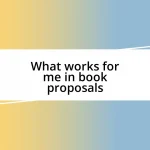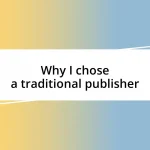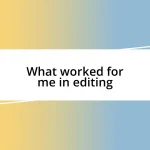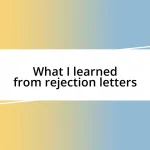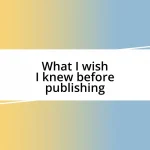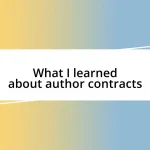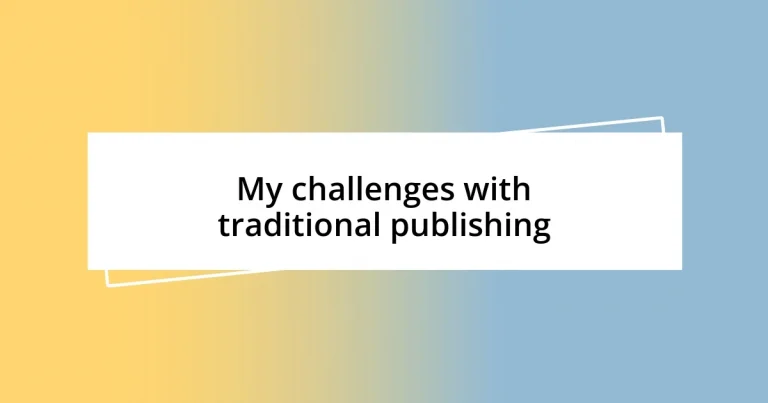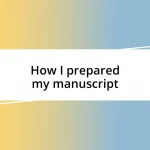Key takeaways:
- Facing rejection is part of the publishing journey; viewing it as constructive feedback fosters resilience and growth.
- Finding the right literary agent involves research and personal connection; building relationships in the literary community is crucial.
- Effective marketing requires engaging authentically with your audience, creating conversations, and building an author brand beyond just announcing book releases.
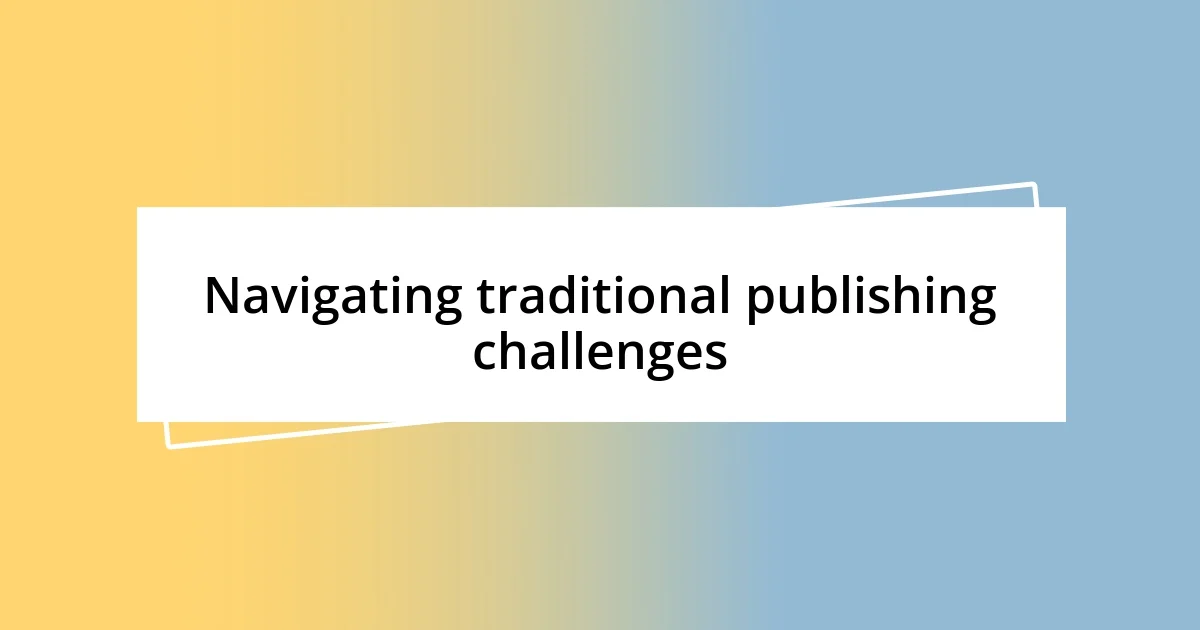
Navigating traditional publishing challenges
Navigating traditional publishing challenges can often feel like embarking on a long, winding road with no clear destination in sight. I remember my excitement when I first submitted my manuscript to a traditional publisher. The thrill of envisioning my book on the shelves was palpable, but that anticipation quickly turned into uncertainty when rejection emails began to flood my inbox. It’s difficult not to take those rejections personally, isn’t it? Every note feels like a judgment on your creativity and hard work, and it can be crushing.
One of the biggest hurdles I’ve faced is understanding just how competitive the landscape is. I once attended a writers’ conference where I learned that hundreds of manuscripts land on the desks of agents and editors daily. That realization prompted me to rethink my strategy and really hone my pitch. I started to wonder: what makes a manuscript stand out in such a crowd? From my experience, it often boils down to the unique voice and angle that only you can provide.
Then there’s the elusive quest for the right agent. It can feel like dating in a way—finding someone who truly understands your work and shares your vision. I felt a flutter of hope each time I approached a new agent, but it was also nerve-wracking. The question loomed large: would this be the person who believes in me? Eventually, I realized that patience and resilience are just as crucial as talent in this process. Do you ever find yourself wondering if you’ll ever find that perfect match? I have, and through the ups and downs, I’ve learned that persistence is key.
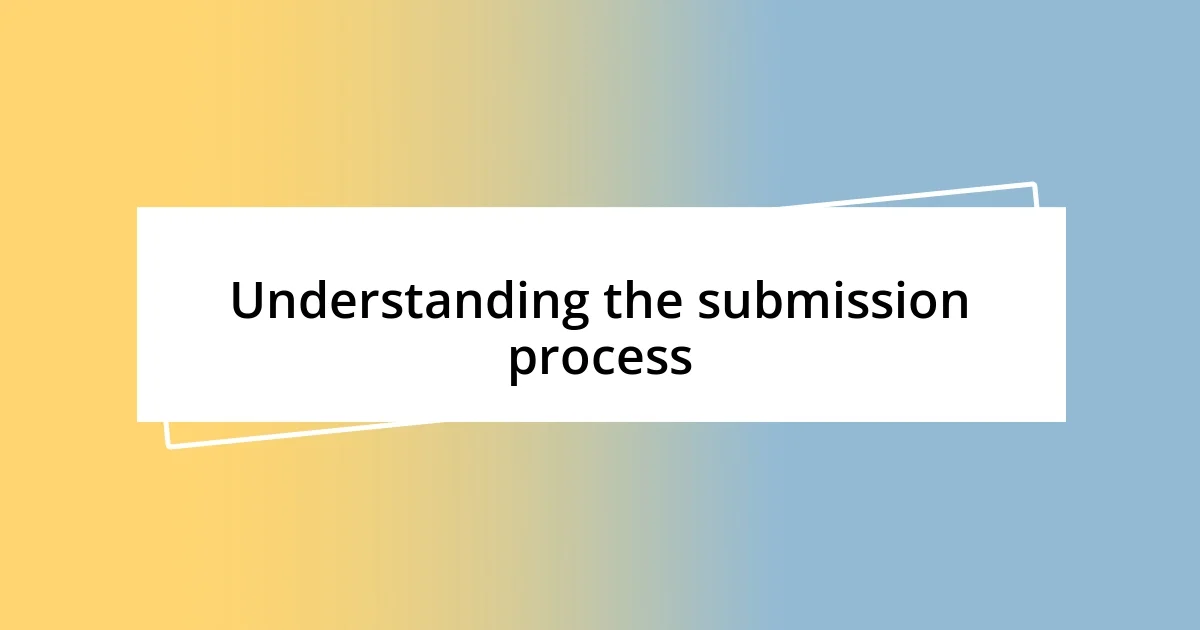
Understanding the submission process
Understanding the submission process can be a bit daunting, as the steps involved are often convoluted and vary from one publisher to another. I learned this the hard way during my first submission. After meticulously crafting a query letter, I eagerly sent it off, only to realize I hadn’t followed the publisher’s specific guidelines. Talk about a sinking feeling! It’s these details that can trip you up, so it’s vital to thoroughly research each publishing house before hitting send.
Here’s a succinct list of the steps I recommend for navigating the submission process effectively:
- Research Publishers: Identify publishers that align with your genre and vision; it’s about finding the right fit.
- Review Submission Guidelines: Pay close attention to each publisher’s requirements regarding format and content to avoid unnecessary rejections.
- Craft a Compelling Query Letter: Capture the essence of your story and your unique voice, making sure to address the specific agent or editor.
- Prepare a Synopsis: A concise summary of your book can be essential, so make sure it highlights the major plot points and character development.
- Stay Organized: Keep track of your submissions, including which publishers you’ve approached and their responses, to manage follow-ups effectively.
I’ve found that patience is just as important as the submission techniques themselves. I often remind myself that rejection is not a reflection of my worth but rather a stepping stone on this intricate path.
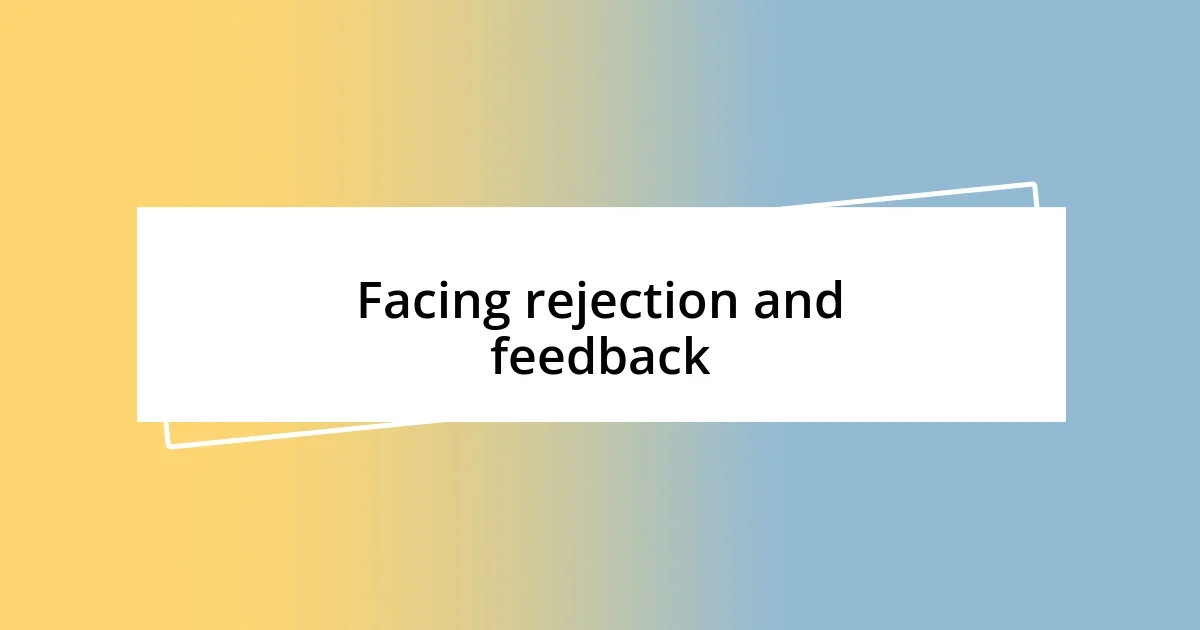
Facing rejection and feedback
Facing rejection and feedback is an inevitable part of the traditional publishing journey. I remember one particular submission where I had poured my heart and soul into the manuscript, only to receive a rejection that simply stated, “Not what we’re looking for.” Those words stung. It felt like all my effort had been reduced to a vague dismissal. Yet, through this experience, I learned that feedback, even when harsh, is an invitation to grow.
It often struck me how subjective the process could be. I once rewrote my first chapter three times based on different feedback from two separate agents. Each agent loved different aspects of the narrative. This led me to understand that one person’s rejection could be another’s approval. It’s essential to sift through feedback critically, accepting constructive criticism while staying true to your voice. I frequently remind myself: every piece of feedback is a puzzle piece that can help shape my work into something truly unique.
Embracing the challenge of rejection has forged resilience in me. There was a time when I submitted a piece to a highly respected literary journal, only to have it returned with a note suggesting I stick to writing “lighter material.” At first, I felt devastated, but those words nudged me towards a different path. I leaned into writing the deeper, more impactful pieces I loved, discovering a strength I didn’t realize I had. Have you ever felt like rejection propelled you onto a greater calling? That experience taught me to view rejection not as an end, but as a new beginning.
| Type of Feedback | My Response |
|---|---|
| Rejection without explanation | Initial despair, followed by a determination to seek clarity and improve. |
| Constructive criticism | Valuable insights that sparked revisions and helped refine my story. |
| Positive feedback | Boosted my confidence and reinforced my commitment to my writing style. |
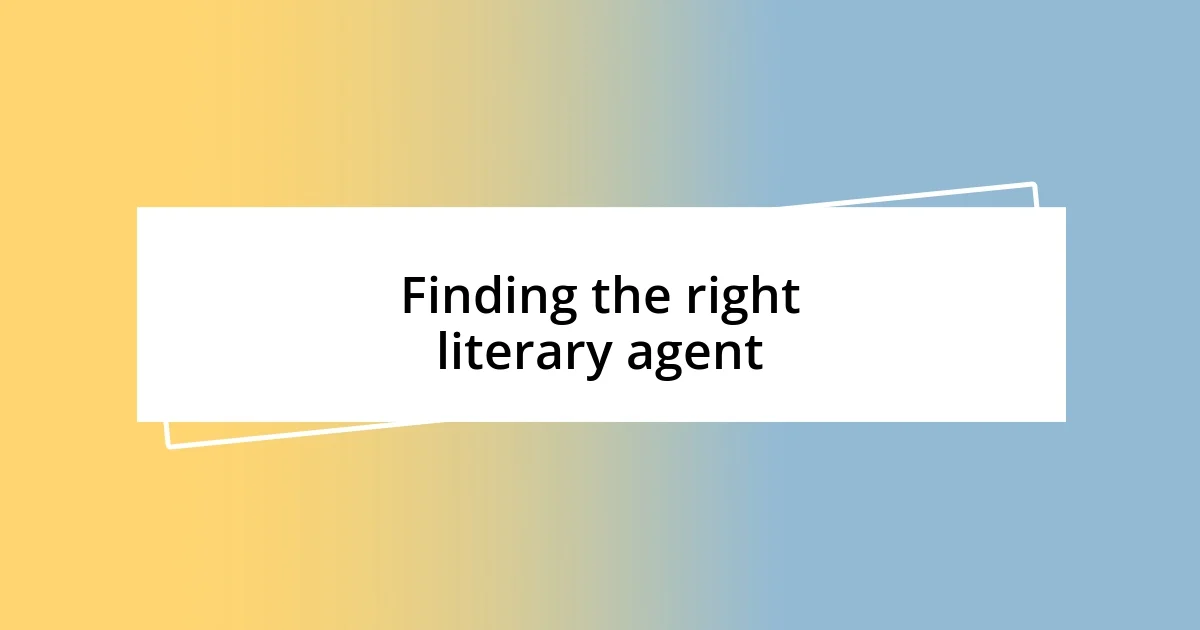
Finding the right literary agent
Finding the right literary agent can feel like searching for a needle in a haystack. I remember, during my search, I came across an agent who was highly recommended by other writers, but after sending a query, I realized they didn’t represent my genre. It’s like trying to fit a square peg into a round hole; no matter how hard I tried, it just wouldn’t work. You have to ask yourself: is this agent truly the right match for my writing style and goals?
Once I learned more about what to look for in an agent, the process became less intimidating. I actively researched agents’ backgrounds and their recent deals, which helped me narrow down my list. I even found a few agents who not only liked the types of stories I wrote but also genuinely connected with them, which made my submissions feel more purposeful. Have you ever felt that spark of connection with someone? It can be a game-changer in this business.
In my experience, reaching out to agents was also about building a relationship. I once attended a writers’ conference where I pitched my manuscript directly to an agent. Not only did we click during our conversation, but they also encouraged me to send my work after the event. That personal touch really reaffirmed the importance of not just sending a query into the void, but making real connections within the literary community. Who knows? That next networking opportunity could lead you to your ideal agent.
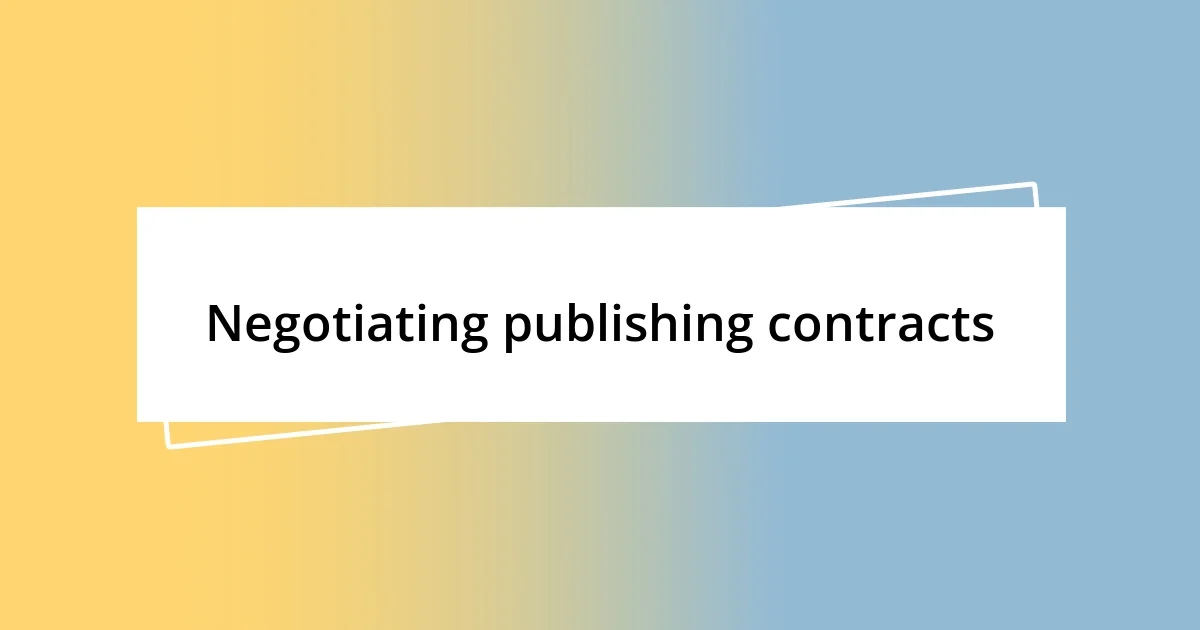
Negotiating publishing contracts
Negotiating publishing contracts can feel daunting, especially when you’re passionate about your work. I remember sitting at my kitchen table, staring at the first contract I received. My heart raced as I scanned the paragraphs full of legalese, wondering if I was getting the best possible deal. How do you even know what to negotiate? For me, it came down to understanding my rights and knowing my worth as a writer.
One particular time, I faced a clause that just didn’t sit right with me. It was a rights grab that would have allowed the publisher to control my work in ways I wasn’t comfortable with. I took a deep breath, reminded myself that every great writer has had to fight for their vision, and pushed back. In the end, we found a middle ground. It was a turning point, teaching me that advocating for myself was not just important but essential. Have you ever felt that rush of empowerment when standing your ground?
Moreover, I found that negotiating is not just about getting what you want—it’s also about building a partnership. I once had a long conversation with an editor who was open to discussing changes. This back-and-forth dialogue created an atmosphere of collaboration. Instead of viewing it as a battle, I learned to see it as a way to share my intentions and ensure we were on the same page. When did you last experience such collaboration in your own projects? Those discussions have often led me to unexpected insights that improved my work considerably.
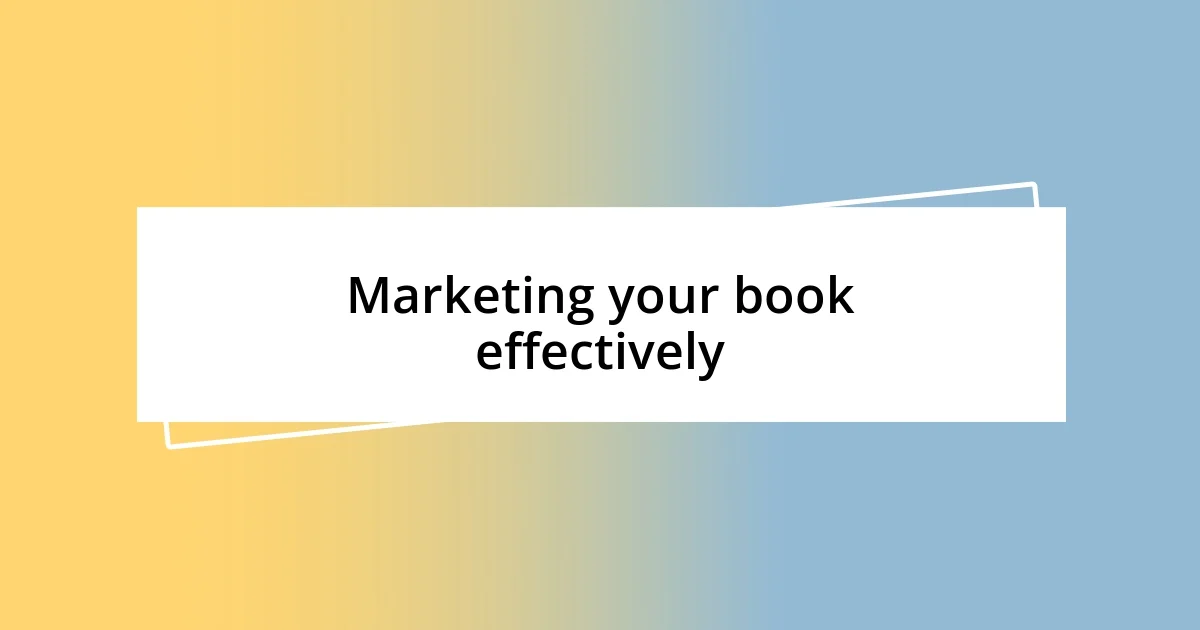
Marketing your book effectively
Marketing your book effectively is a crucial step that many forget after securing a publishing deal. I vividly recall when my first book hit the shelves; I thought readers would simply flock to it. But instead, it felt like shouting into a void. That’s when I learned that marketing is not just about announcing your book’s release—it’s about creating a vibrant conversation around it.
One of the most powerful tools I found was engaging with my audience on social media. I remember hosting a live Q&A session that went better than I had anticipated. It was exhilarating to see real-time questions pop up and to share personal stories that resonated with my readers. Have you ever had that moment where a simple interaction transformed how you view your audience? Connecting authentically can turn casual followers into devoted fans who champion your work.
Additionally, I discovered the importance of building an author brand. I once collaborated with a local bookstore for a reading event, which not only boosted attendance but also allowed me to showcase my personality beyond the pages of my book. It felt genuinely rewarding to share my journey and hear feedback directly from readers. How often do we take the time to step out from behind our manuscript and share our stories with the world? This endeavor taught me that marketing is about relationships, not just transactions; it’s about letting your readers in on your journey and evolving alongside them.
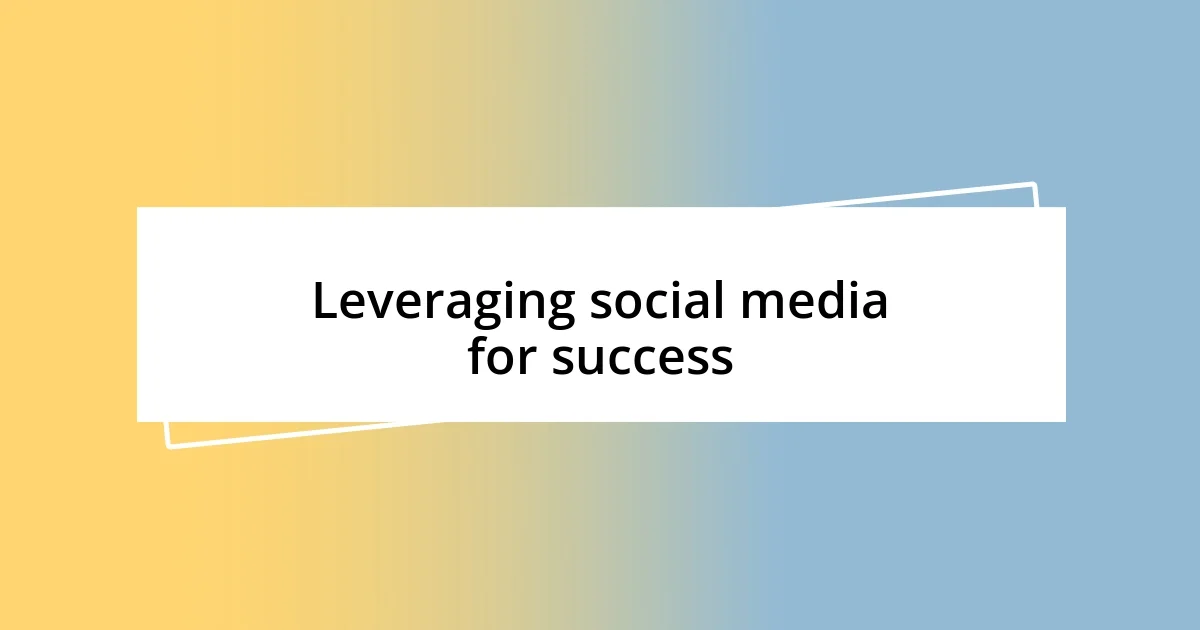
Leveraging social media for success
Utilizing social media effectively can be a game changer in the realm of publishing. I recall a particularly poignant moment when I decided to share snippets of my writing process on Instagram. The responses were overwhelmingly positive, and I was surprised to find that sharing a behind-the-scenes look made my followers feel connected to my journey. Have you ever experienced that thrill of unexpected support from strangers? It’s an incredible feeling that reminds you that your words resonate beyond the page.
I also made it a point to join writing groups on platforms like Facebook. Engaging in discussions about our shared challenges opened the door to collaborations I hadn’t imagined. I remember one post where I asked for tips on overcoming writer’s block, and the flood of advice was both enlightening and reassuring. There’s a certain comfort in knowing that others are in the same boat, isn’t there? That kind of connection turned what could have been a solitary struggle into a community effort.
Another strategy I embraced was using Twitter to keep my writing goals public. I started tweeting about my daily word count and the hurdles I faced along the way. The accountability of sharing progress kept me motivated, but it also sparked conversations with fellow writers who were facing similar challenges. Isn’t it remarkable how a simple tweet can forge bonds and inspire creativity? By leveraging social media in this way, I discovered that success isn’t just about promoting my book; it’s also about creating a supportive network that fosters growth and resilience in an often competitive landscape.

